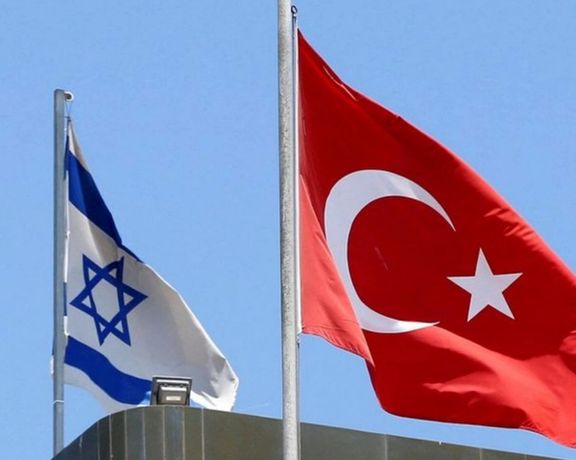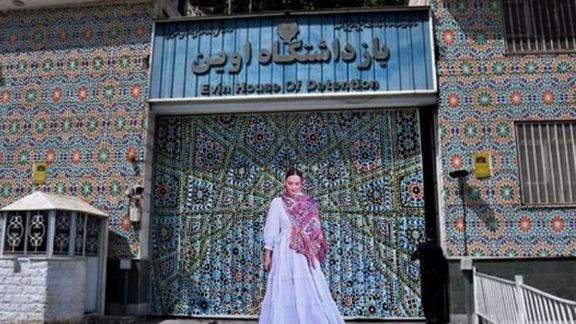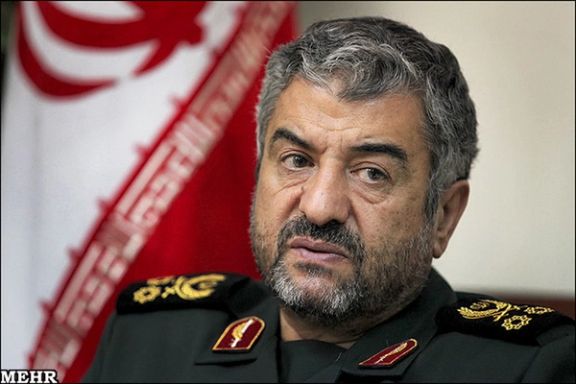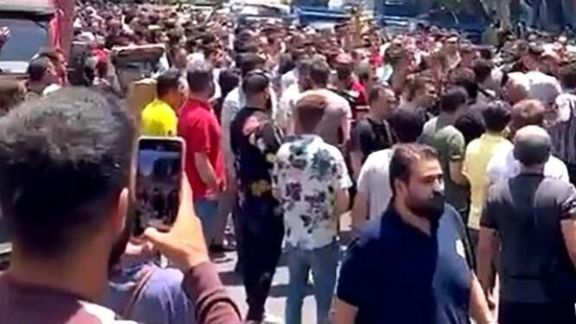Iraq Reportedly Starts Paying Its Debts For Gas Imports From Iran

The Iraqi Electricity Ministry has begun paying off its debts for gas imports from Iran that were hindered due to the US sanctions on the Islamic Republic since.

The Iraqi Electricity Ministry has begun paying off its debts for gas imports from Iran that were hindered due to the US sanctions on the Islamic Republic since.
Iranian Petroleum Minister Javad Oji said on Wednesday that the country received $1.6 billion of the debts after a spokesman for Iraqi Electricity Ministry, Ahmed Moussa, told the Iraqi News Agency (INA) on Tuesday that Baghdad would pay the debt within two days.
The Iraqi spokesman issued a statement stressing the necessity to pay the Iranian gas debts overdue since 2020 to prevent a decrease in the quantities of gas flow to the country.
He also thanked Prime Minister Mustafa Al-Kadhimi for his care, direct supervision, and the role of the parliament, which understands the country’s dire need of electricity.
US banking sanctions imposed on Iran hindered payments by Iraq although Iran on many occasions announced receipt of payments.
Last Wednesday, the Iraqi parliament passed an emergency finance bill for "food security and development" -- totaling 25 trillion Iraqi dinars, approximately over $17 billion -- to pay debts to Iran to ensure gas supplies and stop worsening power cuts. Of that, $2.6 billion will be allocated to settling Iraq's gas and electricity debts, as well as for buying further energy supplies from abroad.
Despite its immense oil and gas reserves, Iraq remains dependent on imports to meet energy needs, especially from neighboring Iran, which currently provides a third of Iraq's gas and electricity needs.
Iran had demanded Iraq pay $1.6 billion it owes for gas imports by the start of June to guarantee further supplies, as it is cutting or reducing supplies regularly due to its own shortages.

Turkey has reportedly warned the Islamic Republic against attacking Israelis in Turkey, saying it is not prepared to allow Iran to use its territory to carry out acts of terrorism against other nations.
According to an unsourced report on Israel’s Channel 12 news on Wednesday, Ankara has conveyed “blunt and forceful messages” to Tehran regarding the issue amid an urgent Israeli warning to its citizens not to travel to Turkey.
Israeli Foreign Minister Yair Lapid called on Israelis in Turkey on Monday to leave immediately and for citizens to cancel travel plans to the country following reports that an Iranian plot to assassinate Israelis in Istanbul was foiled at the last moment, and that Turkish authorities had uncovered a network of Iranian agents aiming to target Israelis.
Despite the threat posed by the Iranian agents in Turkey and the stern travel advisory, some Israelis are reportedly ignoring the warnings while Turkey has expressed its unhappiness with the expected blow to its tourism.
Turkey’s chief rabbi told The Jerusalem Post, “I think that Israelis should continue to come and visit... They can come and enjoy it without making a fuss about it.”
“There was an issue that occurred, [and] the State of Israel rose to its feet – and rightly so... We have police officers guarding our synagogues on behalf of the government,” he said.
The members of the community have remained careful ever since “twice we had a disaster” – namely, the terrorist attacks that occurred at the Neve Shalom synagogue in 1992 and 2003, he noted.

A mass wedding ceremony at a military academy of Iranian Army’s Ground Forces has led to a barrage of criticism over the use of a red Ford Mustang festooned with flowers as the wedding car.
The photos of the collective weeding of at least 100 couples at Imam Ali Officers' University went viral on Wednesday by Iranian social media users who were shocked that the cadets who chant “Death to America” during their trainings daily are tying the knot in one of the most iconic American cars.
While many are irked by the hypocrisy, most people have made fun of the combination of a red Ford Mustang with a white chador, an outer garment or open cloak worn by Muslim women.
While Iranian authorities, especially military officials, never lose a chance to criticize the use of American brands, many of them and their family members pay large amounts of money to use the sumptuous products.
Earlier in the year, a selfie of Qasem Soleimani’s daughter holding the latest iPhone 13 was picked up by Iranian social media users who began reposting it to make the point that the phone the daughter of the former Qods (Quds) force commander uses to demand retribution for the United States, is an iPhone.
Collective weddings, which appeared in Iran in the 1990s, are promoted by the authorities to encourage marriage among young people, who hesitate mainly over the sheer costs of holding a wedding ceremony. Their costs are usually covered by various government institutions, with the office of the Supreme Leader’s representative for universities as one of the main funders.

Many have accused a female social media influencer who visited Iran in a 'fam trip' of distorting reality in the Islamic Republic in an "arranged visit".
‘Fam trip’ (familiarization trip) is nothing new in Iran. For years the Islamic Republic has been using foreign reporters in Iran and sometimes arranged visits by famous travel documentary filmmakers to create a "beautified" image of the Islamic Republic for viewers in other countries.
The intent is averting often self-inflicted propaganda that portrayed the Islamic Republic as a country where the government had no respect for human rights and people including children watched executions in the streets, government officers cut off criminals’ limbs in public and chastity police harassed and battered women whose headscarf and dress was considered to be indecent.
During the past week, almost the entire Persian social media turned against Hoda Rostami, a young woman living abroad, and a social media influencer, who took a ‘fam trip’ to Iran and published her own or other female tourists' images next to mosques, ancient relics and even the notorious Evin prison on social media, particularly on her Instagram page, which has some 46,000 followers.
According to Rouydad24 news website in Iran, Rostami beautifies all ugly things on this page and her images of women in the Iranian society, with attire that would otherwise illicit a tough response from the police. Her presentation of supposed freedoms is inconsistent with the reality on the ground. The website added that the Iranian police will stop anyone else doing the same in those places. The website also questioned how she and other women in her photos can be in public without any objection by the police.
Social media users accused Rostami of "normalizing misery," while some even said that what she was doing was "blood washing" meaning that she was washing the blood off the hands of the Islamic Republic, when security forces have killed hundreds of protesters in recent years who were demanding freedoms she portrays as existing in Iran. In many of those images Rostami and her "guests" are seen in public with no hijab, although ordinary people will be arrested on the spot.
She also revealed after being criticized by netizens that she had meetings with state officials at ministerial level to facilitate the fam trips.
Last week, investigative reporters on social media found out that Hoda Rostami, now reportedly a citizen of Sweden, was in fact born in Iraq and that her father is a senior figure in Hashd al-Sha'bi, an Iranian proxy militia group in Iraq.
Some on social media said that lived in Iran for several years adecade ago, learned Persian and run tours for foreigneres. Apparently her original Iraqi name is Hoda Jabbar Karim.
Many have pointed out that her pictures showing Iranian women at the seaside are flat and fabricated lies. Rouydad24 reminded that two mosques and ancient sites were shut down in Shiraz two years ago only because some tourists were not wearing the kind of dress consistent with compulsory hijab rules. The website also reminded that in some mosques visitors are even not allowed to have their cameras with them.
Recently, the Russian ambassador to Tehran said that what stopped Russian tourists from visiting Iran was compulsory hijab and the fact that drinking alcohol is prohibited in Iran.
Hoda Rostami previously objected to similar comments when they were meant to prove her wrong, but she has been silent after her Iraqi identity and her links with some Iranian state officials have been disclosed.
A social media user wrote that she was arrested in Iran's Qeshm Island because she was there in the same kind of outfit used by Rostami. She wrote: "Iran is much different from what Hoda portrays."

The former commander-in-chief of the Iranian Revolutionary Guard says when Israel carries out an operation against Iran, it receives several responses in retaliation.
Major General Mohammad Ali Jafari said on Wednesday that Israeli officials know what blows they have received from the Islamic Republic so far, “some of which are still in progress” but have remained confidential.
He said Israel “has suffered several blows from the Islamic resistance in different countries across the region, and even inside the occupied Palestinian territories.”
Refereeing to the assassination IRGC’ Quds Force colonel Hassan Sayyad-Khodaei – who was killed outside his home in Tehran late in May -- Jafari said that unlike Israel the Islamic Republic cannot publicize many of these blows as these operations have often been kept confidential.
Following reports of a thwarted plot by Iranian agents to target Israelis in Turkey and a drone attack at Iraq's Erbil last week, the Iranian foreign ministry spokesman said Monday that any “response” by the Islamic Republic against Israel would take place inside Israel “and not in a third country.”
On Sunday, Iraqi Foreign Minister Fuad Hussein criticized Iran for its aggressive behaviors toward Iraq and the Kurdistan Autonomous Region, and denied Tehran’s allegations that the Israeli Mossad is present in Erbil, saying “We find it strange that Iran chose the Kurdistan region to respond to Israel.”
In March, Iran fired missiles at Erbil. No one was killed but missiles did damage to some residential buildings. Iran claimed it used 12 ballistic missiles in that attack and targeted an Israeli intelligence center.

A group of UN human rights experts have expressed serious concerns about the violent crackdown against civil society in Iran, especially against members of workers’ unions and teachers.
In a statement issued on Wednesday, they urged those responsible for using excessive force to be held to account through comprehensive and independent investigations.
“We are alarmed at the recent escalation of allegedly arbitrary arrests of teachers, labor rights defenders and union leaders, lawyers, human rights defenders and other civil society actors,” they said.
In their statement, they said until May 24 over 80 teachers were arrested or summoned by security forces or the judiciary, and the houses of several trade unionists and teachers were raided, none of whom were given access to a lawyer.
The authorities issued statements claiming that the arrests were due to “infiltration of foreign-affiliated elements into the ranks of teachers and workers” which threatened security of the country, they said.
“The space for civil society and independent associations to carry out their legitimate work and activities is becoming impossibly narrow,” they said, adding that “The crackdown comes in the context of an extremely dire economic situation, which the authorities themselves have acknowledged.”
“We call on the authorities to address the underlying causes of the protests, and to ensure that everyone can exercise their rights to freedom of expression, association and peaceful assembly.”
Anti-government protests and strikes by merchants continued in Iran for the fourth consecutive day in the capital Tehran and many other cities and towns on Wednesday.